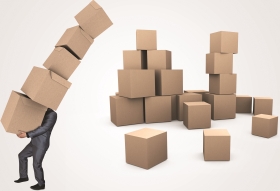

The logistics industry relied heavily on people in the past, and to a large extent still does today. As in every other sphere of life, however, the role technology plays is increasing rapidly, with a host of solutions available to streamline supply chains and increase the efficiency of logistics in general.
Hi-Tech Security Solutions asked two experts in the field for their insights into how technology can and is changing the game.

Eamon McCann, CTO of The Argility Technology Group:
The ongoing advances in IOT capabilities have positioned technology as a strong enabler in the management and security of assets. There are various devices readily available that leverage GSM, Sigfox and LoRaWAN technologies, as well as others including RFID tags/labels and BLE beacons. These are now all potential options to cost-effectively assist in the identification of the physical positioning of assets for both static and mobile security applications.
The potential areas that could benefit are extensive, and range across multiple industries, including construction, mining, manufacturing and agriculture. Moreover, associated assets such as vehicles, machinery, fridges, crates/produce etc. can be identified and tracked to a specific geolocation, enhancing visibility and providing an associated increase in security and assisting in loss prevention.
Argility’s SkyData IOT cloud platform enables these capabilities by allowing asset tracking and exception management, thereby enabling supply chain security and the efficiency of associated processes. Geofencing allows event and alert creation for entry and exit conditions, for example, automatically raising a proof of delivery when an asset reaches its predefined destination, as well as tamper and theft alerts when assets move location without authorisation.
Other applications like the tracking of pallets and cages with RFID capability when entering receiving bays or leaving dispatch areas can assist in reducing loss and driving efficiencies through the warehouse and the wider supply chain. Configurable alarms and alerts, with various levels of severity, can be routed to the appropriate level(s) within the organisational hierarchy to ensure visibility and auditability for any such event.
SkyData can integrate into any business operational system, feed from and to multiple data sources and deliver data sets to any mobile device. It provides for Web-based administration plus configuration and it includes mobile apps for both Android and iOS for remote access – anytime, anywhere. The bottom line is that this IoT platform is set to transform asset and resource monitoring management.

Shaun O’Brien, CEO of Cquential
If you are not considering technology within your business or do not at least have a strategy around implementing technology, the company may be at a disadvantage when compared to its peers. Technology is the name of the game. It’s not seen as a luxury anymore but a necessity to do business in a highly competitive environment.
Supply chains have been one of the business functions that have benefited the most when it comes to technology and the capabilities it has to offer. A modern supply chain is at the point where it will not be relevant or valuable to an organisation if there is no intention of implementing technology to keep up with industry standards.
Technology enables businesses to automate manual processes and get people to focus on other areas that can add value to the organisation. The company is also in a better position to handle complexity and meet the needs of a customer with high expectations concerning turnaround time and service. Information sharing and collaboration across partners and departments is also crucial when it comes to running an efficient operation.
Warehouse management is a specific function within the supply chain that has benefited from technology over the last 10 years. The technology has driven the following benefits:
• Improved visibility across operations.
• Driven collaboration and information
sharing across different departments.
• Driven labour/MHE efficiencies.
• Improved capacity management.
• Improved traceability of stock.
• Reduced operational expenses.
• Improved customer service levels.
• Automation of manual tasks.
• Improved scalability.
Technology is changing the way the warehouse operates for the better. It’s becoming more affordable and readily available to any size of business. The key is to have a digital roadmap and prioritise the different items based on operational requirements. It’s not a one-size-fits-all approach when it comes to technology. The first step is to understand the current business and processes. Once this is understood the next phase will be to understand the functionality and business proposition of the various solutions and how they can be applied to your specific use case. The last step will be to review and measure to understand if the business is achieving the business benefits that it set out to achieve in the beginning.

© Technews Publishing (Pty) Ltd. | All Rights Reserved.